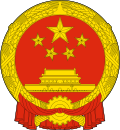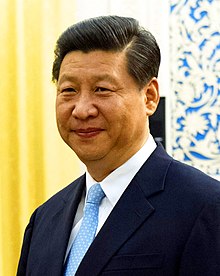President of the People's Republic of China
| President of the People's Republic of China 中华人民共和国主席 |
|
|---|---|

|
|

|
|
| Style | Mr. President (主席) |
| Type | nominal figurehead |
| Status | Head of State |
| Residence | Zhongnanhai (informal) |
| Seat | Beijing |
| Nominator | the Presidium of the National People's Congress |
| Appointer | the National People's Congress |
| Term length | Five Years, renewable once consecutively |
| Constituting instrument | Constitution of the People's Republic of China |
| Inaugural holder |
Mao Zedong as the first President under the 1954 Constitution Li Xiannian as the first President under the 1982 Constitution |
| Formation | 27 September 1954 18 June 1983 |
| Abolished | January 1975 - December 1982 |
| Deputy | Vice President |
| Website | Presidency |
| President of the People's Republic of China | |||||||
| Simplified Chinese | 中华人民共和国主席 | ||||||
|---|---|---|---|---|---|---|---|
| Traditional Chinese | 中華人民共和國主席 | ||||||
| Literal meaning | Chinese People Republic Chairperson | ||||||
|
|||||||
| Alternative Chinese name | |||||||
| Simplified Chinese | 国家主席 | ||||||
| Traditional Chinese | 國家主席 | ||||||
| Literal meaning | State Chairperson | ||||||
|
|||||||
| Transcriptions | |
|---|---|
| Standard Mandarin | |
| Hanyu Pinyin | Zhōnghuá Rénmín Gònghéguó Zhǔxí |
| Transcriptions | |
|---|---|
| Standard Mandarin | |
| Hanyu Pinyin | Guójiā Zhǔxí |
The President of the People's Republic of China is the head of state of the People's Republic of China (PRC). Under the constitution, the presidency is a largely ceremonial office with limited powers. However, since 1993, as a matter of convention, the presidency has been held simultaneously by the General Secretary of the Communist Party of China. The office is officially regarded as an institution of the state rather than an administrative post; theoretically, the President serves at the pleasure of the National People's Congress, the legislature, and is not legally vested to take executive action on its own prerogative. The current President is Xi Jinping, who took office in March 2013.
Since 1993, apart from brief periods of transition, the top leader of China simultaneously serves as the President, the head of the party, and the commander-in-chief of the military (as Chairman of the Central Military Commission). This individual then carries out different duties under separate titles. For example, the leader meets foreign dignitaries and receives ambassadors in his capacity as President, issues military directives as Chairman of the Central Military Commission, and upholds party rule through the office of General Secretary.
The office was first established in the Constitution of the People's Republic of China in 1954 and successively held by Mao Zedong and Liu Shaoqi. Liu fell into political disgrace during the Cultural Revolution, after which the office became vacant. The office was abolished under the Constitution of 1975, then reinstated in the Constitution of 1982, but with reduced powers. The official English-language translation of the title was "Chairman"; after 1982, this translation was changed to "President", although the Chinese title remains unchanged.
The President is limited to serve up to two terms of five years each.
...
Wikipedia

